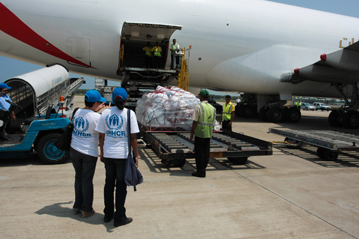Refugees join in Afghanistan's political rebuilding
Refugees join in Afghanistan's political rebuilding

PESHAWAR, Pakistan, Nov 5 (UNHCR) - Afghan refugees in Pakistan, after years of exile imposed by the violence in their homeland, are enthusiastically turning to the ballot box to join in the peaceful reconstruction of Afghanistan.
With the UN refugee agency providing assistance, the 1.1 million refugees in the camps are working with the Constitution Commission of Afghanistan to select delegates who will represent them in Kabul next month when 500 delegates attend a landmark Loya Jirga, or Grand Council of Afghan elders, which will decide on a new constitution for their country.
"Refugees should play their role in the reconstruction and rehabilitation process of Afghanistan and the constitution is a milestone in all this," Zahir Khan Jabarkhel, head of the Peshawar office of the Constitution Commission, told refugee camp leaders who assembled this week to select a delegate to the constitutional Loya Jirga.
The vote for a delegate to represent refugees from four districts of Pakistan's North-West Frontier Province (NWFP) was the latest stage in a process of consultation, debate and selections at various levels to ensure that the new constitution emerges with legitimacy - itself part of a broader political renaissance of Afghanistan that will include national elections expected next year.
"The selection process resembles a tree and it starts from the roots - the people in the refugee camps. You are the stem and the selected representative will be the fruit," said Zahir Khan. "You have great responsibilities on your shoulders. Try to select the right man."
The draft of the constitution was unveiled on November 3, calling for an Islamic republic with a bicameral parliament. Under the proposal, a directly elected president will have strong powers to appoint and dismiss the cabinet in consultation with parliament.
Five hundred delegates will debate the draft at a Loya Jirga expected to start on December 10 in Kabul, with 24 chosen by the Afghan refugees in Pakistan and Iran. Of the 13 representatives from Pakistan, seven are coming from NWFP, four from Balochistan and one each from the provinces of Sind and Punjab.
The role of the UN High Commissioner for Refugees is to assist the process, helping the Constitution Commission to understand the distribution of the refugees in more than 200 camps, some almost a quarter century old. UNHCR must also ensure that they meet the refugees to explain the purpose and see that the process is completed.
Pakistan's camps were divided into regions using UNHCR figures, and refugees in each region were asked to select the electors who would attend a meeting for the final vote on a delegate to the Loya Jirga. To ensure that women are represented, one of the seven Loya Jirga positions for NWFP was reserved for a woman who was chosen today. Additional women to represent refugees could be selected by Afghanistan's Interim-President Hamid Karzai, who will personally appoint 50 members of the Loya Jirga.
The voting for the Loya Jirga seats has yet to begin in Balochistan, Sind and Punjab, but in NWFP representatives of various refugee camps assembled in the provincial capital this week.
The 49 electors who gathered in Peshawar represented 274,000 refugees in 37 different camps scattered across the districts of Kohat, Thal, Hangu and Kurram Agency. These districts constitute one of five electoral zones drawn up for NWFP - four zones will each select one delegate to the Loya Jirga while the densely populated Peshawar district which will select three, including one woman.
"Refugees are very democratic and once understood, they have always appreciated the electoral mechanism," said Qutbudin Roydar, manager for the elections in Peshawar. "The hard part of the job is done; the voter lists of all five electoral zones in NWFP are prepared and the final proceedings [selecting one delegate to Kabul] will take one day."

Just as in more experienced electoral systems, four of the 10 listed candidates withdrew at various points in the proceedings, throwing their support behind other candidates. In the end, there was a lopsided win for Fazal Rahman, a 55-year-old refugee originally from the Afghan province of Khost.
"I am grateful to my camp fellows for nominating me and to those who withdrew their names from the list of contestants in my favour," Rahman said after he collected 20 of the 49 votes, with the others split between the five other candidates.
"I assure the refugees that I will safeguard their rights in the constitution and they don't need to have any doubts," said the newly-elected Loya Jirga delegate. "I have been a refugee for the last 24 years and I know our rights very well."









